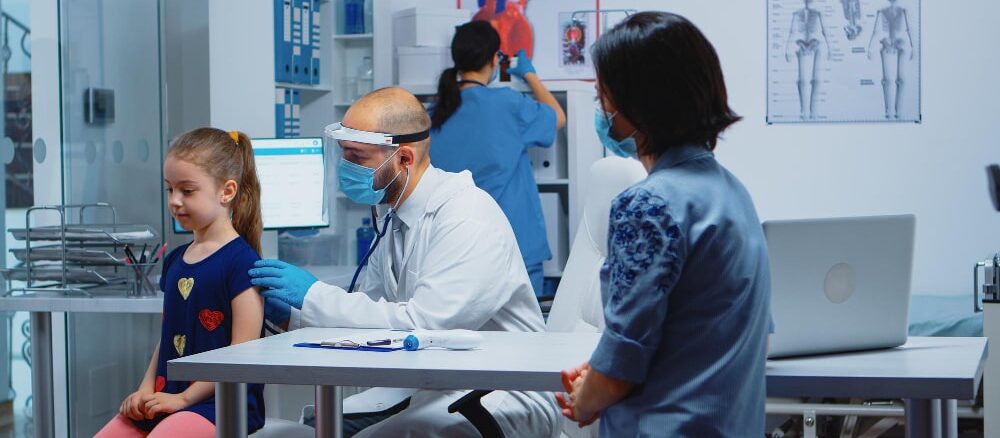Maintaining excellent health and avoiding potential medical problems require routine physical exams. These tests give medical professionals a chance to evaluate patients’ general health, spot disease early warning symptoms, and offer the required advice for a healthy lifestyle.
What is a Routine physical exam?
A doctor who provides primary care will do a routine physical exam, commonly referred to as a comprehensive physical exam, to evaluate a patient’s general health and well-being. The primary care doctor would often inquire about the patient’s medical history, including any existing or previous illnesses, surgeries, or prescriptions, during the examination. They will then proceed to perform a thorough physical assessment, which may involve checking vital signs such as blood pressure, heart rate, and temperature, examining the body systems, listening to the heart and lungs with a stethoscope, palpating the abdomen, and assessing the patient’s general appearance. Additionally, a routine physical exam may include laboratory tests such as blood work, urine analysis, and screenings for conditions like cholesterol levels or diabetes. The purpose of this exam is to detect any potential health issues, provide preventive care, and establish a baseline for future health evaluations. It is often required for activities like school physical exams in Houston to ensure the well-being of students.
Routine Physical Examination Components:
Let’s discuss some of the essential components that should be included in a routine physical examination.
Medical History Review
An extensive study of the patient’s medical history is the first stage of a routine physical examination. This covers talking about current and previous medical issues, allergies, medications, surgical history, and family medical history. Understanding this information helps the healthcare provider assess potential risk factors and tailor the exam accordingly.
Vital Signs Assessment
Important clues about a person’s general health are provided by vital signs. Blood pressure, heart rate, respiration rate, and body temperature are frequently measured as part of this. These evaluations assist in the identification of anomalies or possible underlying medical conditions such as hypertension, tachycardia, or fever.
General Physical Examination
An extensive assessment of the patient’s overall appearance, including physical feature observation, body mass index (BMI) computation, and evaluation of general mobility and coordination, constitutes a general physical examination. The doctor may also check the nails, hair, and skin for any indications of anomalies or skin problems.
Head and Neck Examination
This examination involves checking the head and neck regions for any abnormalities. The medical professional may do vision and hearing examinations as well as evaluations of the throat, nose, ears, and eyes. To find any potential problems, they might also check the thyroid, lymph nodes, and other structures.
Cardiovascular Examination
The cardiovascular examination focuses on evaluating the heart and circulatory system. This often includes listening to the heart sounds using a stethoscope to detect irregularities, such as murmurs or abnormal rhythms. This examination frequently includes checking the legs for swelling, checking the peripheral pulses, measuring the jugular venous pressure, and more.
Respiratory Examination
The respiratory examination assesses the function of the respiratory system. The healthcare provider may listen to the lungs for abnormal breath sounds, evaluate respiratory effort, and assess lung function using techniques like percussion and auscultation. This examination helps identify potential respiratory conditions or abnormalities.
Abdominal Examination
The abdominal examination involves palpating the abdomen to assess organ size, tenderness, or abnormalities. The healthcare provider may also listen to bowel sounds using a stethoscope and check for any signs of organ enlargement, masses, or hernias. This examination aids in the identification of gastrointestinal issues or abnormalities.
Neurological Examination
The neurological examination focuses on assessing the function of the nervous system. It involves evaluating reflexes, coordination, strength, sensation, and mental status. This examination helps detect potential neurological disorders, nerve damage, or cognitive impairments.
Musculoskeletal Examination
The musculoskeletal examination involves assessing the bones, joints, and muscles for any abnormalities, deformities, or signs of inflammation. The healthcare provider may evaluate the range of motion, perform strength tests, and check for signs of joint instability or pain.
Laboratory Tests and Screenings
During regular physical examinations, a variety of laboratory tests and screenings are typically conducted to assess overall health. These assessments commonly involve blood tests to evaluate cholesterol levels, blood sugar levels, and kidney and liver function and to screen for prevalent conditions like anemia, diabetes, or thyroid disorders. Additional screenings, such as mammograms, Pap smears, or colonoscopies, may be advised depending on factors like age, gender, and individual risk profile.
Importance of Routine Physical Exams:
Routine physical exams play a crucial role in maintaining and promoting overall health and well-being. Here are some key reasons highlighting their importance:
Early Detection of Health Issues
Physical exams offer the chance to spot potential health issues at an early stage. Regular examinations that measure blood pressure, examine cholesterol, and screen for cancer can help identify diseases like hypertension, high cholesterol, diabetes, and various malignancies. Early identification enables prompt interventions, which enhances prognosis and improves treatment results.
Disease Prevention and Health Promotion
By making lifestyle changes and adopting preventive measures, individuals can reduce their risk of developing chronic diseases. Routine physical examinations play a crucial role in supporting these efforts. Healthcare professionals can provide personalized guidance and counseling on dietary habits, physical activity, smoking cessation, maintaining a healthy weight, and other preventive measures, helping individuals meet their specific needs.
Monitoring Overall Health
The baseline for tracking a person’s general health state over time is offered by routine physical exams. Healthcare providers can track changes and spot trends that might point to underlying health issues by comparing data like blood pressure, weight, and cholesterol levels.
Building Doctor-Patient Relationships
Physical examinations help build a solid doctor-patient relationship that paves the way for open conversation and the development of trust between patients and their medical professionals. The chance to share worries, ask questions, and get specialized advice on health-related issues is offered through routine checkups.
Updating Vaccinations and Immunizations
Physical exams offer an opportunity to ensure individuals are up to date with necessary vaccinations and immunizations, protecting against various infectious diseases.
Mental and Emotional Health Assessment
Physical exams encompass a holistic approach to health, including the evaluation of mental and emotional well-being. Healthcare providers can assess and address mental health concerns and stress levels and offer appropriate resources or referrals as needed.
Overall, routine physical exams serve as a proactive approach to health maintenance, enabling early detection, prevention, and comprehensive care, thereby promoting overall well-being and longevity.
In order to preserve the best possible health and well-being, routine physical examinations are essential. Healthcare professionals can thoroughly analyze a person’s state of health by incorporating elements like medical history evaluation, vital signs measurement, physical examinations, laboratory tests, and immunizations.
Regular checkups with primary care doctors in Houston or any other location serve as an essential preventive measure, helping to identify potential health issues early on and promoting overall wellness. It is crucial for individuals to prioritize their routine physical exams and collaborate with their primary care doctors to ensure the best possible health outcomes.
Looking for reliable and comprehensive routine physical exams? Look no further than Gemini Urgent Care!
At Gemini Urgent Care, we offer routine physical exams that cover all the essential components you need for a thorough evaluation of your health. Whether you require a school physical exam in Houston or a general checkup, our experienced medical professionals are here to provide top-notch care.
Trust Gemini Urgent Care to provide you with the highest standard of care for your routine physical exam. Your well-being is our priority.

